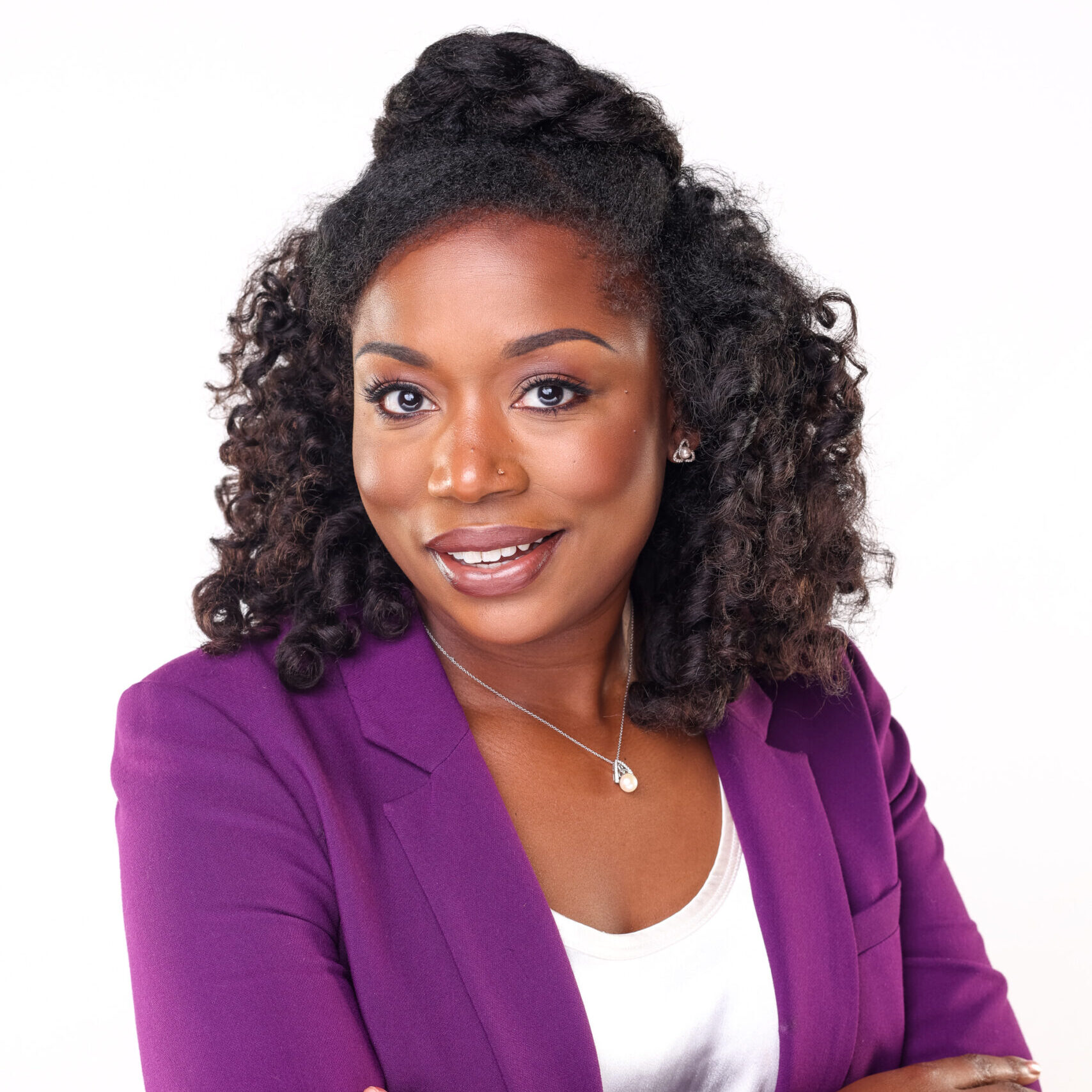2023 Innovator Award Winner
Honors | Experienced Alumnae
Shanae Chapman, CPS’12
Founder and Director, Nerdy Diva

Shanae Chapman’s Nerdy Diva is Turning the Tech Field Upside Down—and Making It More Equitable
by Molly Callahan | September 22, 2023
Shanae Chapman’s company, Nerdy Diva, businesses develop equitable and inclusive tech practices and platforms. But it’s just one of the ways Chapman shares knowledge, opens doors, and builds ladders for the people behind her.
Go far enough inside any industry’s shoptalk, and it can start to feel like a different language. Journalists use words such as “deck” and “orphan” to talk about parts of an article as they’re laid out in newspapers. Architects bandy about “apron” or “boss” to describe specific structural elements.
But it’s perhaps tech developers who use the most bewildering terminology. In this field, “cookies” aren’t just delicious treats; they’re pieces of information sent from internet servers to browsers. A “firewall” isn’t a protective natural phenomenon; it’s a system to keep a secure network safe.
Some of these terms, such as “cookies” or “firewall,” are fairly benign (if confounding to the lay listener). Others, however, have more complex histories. “Master/slave” is one such term. Used to describe an asymmetric relationship between devices or processes, the pair of words have been applied to technological systems since the early 1900s. More recently, the harmful terminology is being replaced with pairs such as “primary/secondary” or even “parent/child.”
This, says Shanae Chapman, whose company, Nerdy Diva, helps businesses develop equitable and inclusive tech practices and platforms, is a step in the right direction.
“This kind of language comes up a lot though, because it’s embedded in the structure of tech companies,” says Chapman. “So, we’ve made resources for teams to learn about more equitable terminology, which helps to make the relationship clear so that people have that understanding moving forward.”
Nerdy Diva does more than that, though. In addition to e-learning modules designed around conscious and anti-racist tech (and more), Chapman’s company provides clients with graphic design help, web support, and expert analysis of ways to improve the user experience of digital products. It’s a full-service suite for budding or growing businesses, all through the lens of inclusive tech. So far, the company has worked with two dozen vendors and partners, including LinkedIn, Camelback Ventures, Lesbians Who Tech, Missouri Environmental Education, Collaborative.ly, and more.
Chapman’s tenacity and her mission, expressed through Nerdy Diva, caught the attention of judges for this year’s Women Who Empower Innovator Awards at Northeastern University. The annual celebration of entrepreneurial and innovative women is organized by the Office of University Advancement at Northeastern. In its three years, 69 founders have connected to foster even greater achievement—and the program has awarded more than $820,000 in funding.
“I thought it was important to have a representative showing of Black women in tech to share information about how to create inclusive products.”
—Shanae Chapman, CPS’12
“I thought it was important to have a representative showing of Black women in tech to share information about how to create inclusive products.”
—Shanae Chapman, CPS’12
Cheryl Kaplan, CEO of M.Gemi and one of the Innovator Award judges this year, found that Chapman’s emphasis on the importance of continual learning, and prioritizing quality over quantity, echoed her own core values.
“I firmly believe that these values are indispensable for achieving long-term success, whether you’re building a business or fostering a strong team,” Kaplan says. “They encourage adaptability, the pursuit of excellence, alignment with one’s personal principles, and ethical decision-making—all of which are fundamental for ensuring sustained prosperity. Whether you’re an individual seeking personal growth or a business striving for enduring success, embracing these values is a prudent decision.”
For Chapman, who started the business in 2018 after a decade working at other tech companies, Nerdy Diva was an opportunity to right some of the wrongs in the field.
“I wanted to continue to share information about design and tech and inclusive ways to create tech that works for everyone—and I thought it was important to have a representative showing of Black women in tech,” she says, “to share information about how to create inclusive products.”
Part of that work is creating new pathways for people who are often overlooked in tech fields. During the summer of 2022, Chapman hired the company’s first group of interns—all three of whom were enrolled in the STL Youth Jobs program in St. Louis, Missouri, where Nerdy Diva is based.
“I’m so proud of being able to create jobs and opportunities for underrepresented people in tech,” Chapman says. “In four years, we’ve been able to have summer interns and contractors, and have given them opportunities to grow. After this, I can be a reference for them for other opportunities and jobs they have, to continue opening doors.”
It’s this—sharing knowledge and experience, opening doors and building ladders for the people behind her—that’s Chapman’s true mission. And Nerdy Diva is just one way of expressing it.
Chapman’s been featured in the New York Times and Good Morning America, in each case sharing advice for jobseekers on negotiating their salaries and asking for raises. She’s taught user experience design and web development courses at Northeastern University, Lesley University, Maryville University of Saint Louis, and Fisher College. Most recently (and in addition to running Nerdy Diva), she’s serving as an instructor for LinkedIn Learning, leading curriculum development for the online learning platform.
This is what it’s all about for Chapman, and she’s not even close to being done. Asked what the future looks like, she rattled off a long—and growing—list of goals:
“Being part of technology and policy discussions about how we use tech in ways that reduce harm and alleviate biases, continuing to work with partners in the community on the city, state, and national level, working with partners in civic education, building a workforce of conscientious tech leaders, creating equitable systems,” she says.“I could keep going.”
And she will.